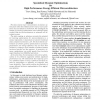Free Online Productivity Tools
i2Speak
i2Symbol
i2OCR
iTex2Img
iWeb2Print
iWeb2Shot
i2Type
iPdf2Split
iPdf2Merge
i2Bopomofo
i2Arabic
i2Style
i2Image
i2PDF
iLatex2Rtf
Sci2ools
111
click to vote
CGO
2004
IEEE
2004
IEEE
Specialized Dynamic Optimizations for High-Performance Energy-Efficient Microarchitecture
We study several major characteristics of dynamic optimization within the PARROT power-aware, trace-cachebased microarchitectural framework. We investigate the benefit of providing optimizations which although tightly coupled with the microarchitecture in substance are decoupled in time. The tight coupling in substance provides the potential for tailoring optimizations for microarchitecture in a manner impossible or impractical not only for traditional static compilers but even for a JIT. We show that the contribution of common, generic optimizations to processor performance and energy efficiency may be more than doubled by creating a more intimate correlation between hardware specifics and the optimizer. In particular, dynamic optimizations can profit greatly from hardware supporting fused and SIMDified operations. At the same time, the decoupling in time allows optimizations to be arbitrarily aggressive without significant performance loss. We demonstrate that requiring up to 512 re...
CGO 2004 | Dynamic Optimizations | Generic Optimizations | Software Engineering | Time Allows Optimizations |
Related Content
| Added | 20 Aug 2010 |
| Updated | 20 Aug 2010 |
| Type | Conference |
| Year | 2004 |
| Where | CGO |
| Authors | Yoav Almog, Roni Rosner, Naftali Schwartz, Ari Schmorak |
Comments (0)

